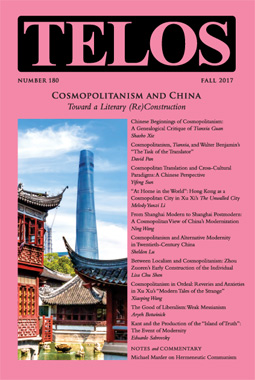Yifeng Sun’s “Cosmopolitan Translation and Cross-Cultural Paradigms: A Chinese Perspective” appears in Telos 180 (Fall 2017), a special issue on Cosmopolitanism and China. Read the full article at the Telos Online website, or purchase a print copy of the issue in our online store. Individual subscriptions to Telos are now available in both print and online formats.
 This paper proposes to investigate the shifting cross-cultural paradigms in response to cosmopolitan thinking and consciousness as well as the nature of cultural translation in relation to cosmopolitanism. The perception of cosmopolitan translation, referring primarily to cultural translation situated fully within the cosmopolitan constellation, is closely linked to cognitive, social, and cultural change in a global and globalizing context. The rapid development of globalization raises questions about nationalism, cultural identity, and, above all, translation itself. Psychological differences between different ethnic groups are centrally concerned with the production and reception of cultural meaning and its dependence upon cross-cultural awareness. Different conceptions of cultural realit(ies) contribute significantly to the creation of cosmopolitan spaces to encourage moving beyond a provincial mind-set. Fear of and resistance to cultural homogeneity may well result in a strong sense of nationalism radically antipathetic to the practice of cultural translation. Increasing hybridization between different cultures through translation moves inevitably toward cosmopolitanism. If cultural translation is mainly about cross-cultural communication, cosmopolitan translation is more concerned with intercultural communication. Increasingly, cultural references, in a cross-cultural sense, are constitutive of cross-cultural intertextuality and are poised to develop into intercultural allusions. These are new challenges to reassess the changed and changing nature of cultural translation, which radically redefines the network of local affinities and allegiances in the process of globalization and calls for an elaborate analysis of the emergent concept of cosmopolitan translation.
This paper proposes to investigate the shifting cross-cultural paradigms in response to cosmopolitan thinking and consciousness as well as the nature of cultural translation in relation to cosmopolitanism. The perception of cosmopolitan translation, referring primarily to cultural translation situated fully within the cosmopolitan constellation, is closely linked to cognitive, social, and cultural change in a global and globalizing context. The rapid development of globalization raises questions about nationalism, cultural identity, and, above all, translation itself. Psychological differences between different ethnic groups are centrally concerned with the production and reception of cultural meaning and its dependence upon cross-cultural awareness. Different conceptions of cultural realit(ies) contribute significantly to the creation of cosmopolitan spaces to encourage moving beyond a provincial mind-set. Fear of and resistance to cultural homogeneity may well result in a strong sense of nationalism radically antipathetic to the practice of cultural translation. Increasing hybridization between different cultures through translation moves inevitably toward cosmopolitanism. If cultural translation is mainly about cross-cultural communication, cosmopolitan translation is more concerned with intercultural communication. Increasingly, cultural references, in a cross-cultural sense, are constitutive of cross-cultural intertextuality and are poised to develop into intercultural allusions. These are new challenges to reassess the changed and changing nature of cultural translation, which radically redefines the network of local affinities and allegiances in the process of globalization and calls for an elaborate analysis of the emergent concept of cosmopolitan translation.








